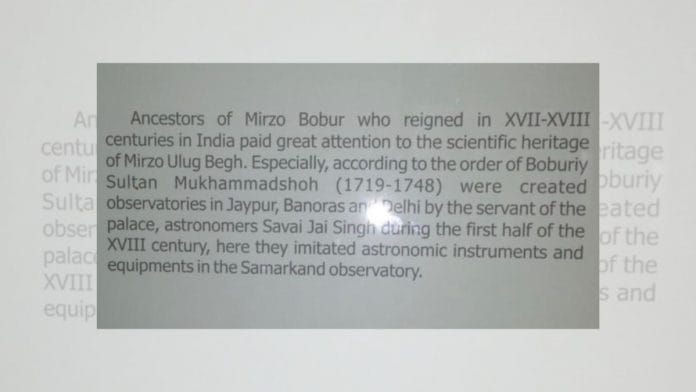New Delhi: Telangana Rashtra Samithi leader K. Kavitha would like the Indian government to take it up with Uzbekistan that a descriptive board outside a museum in capital Samarkand refers to Rajput ruler Maharaja Sawai Jai Singh II as a “servant of the palace” of “Boburiy Sultan Mukhammadshoh” or Mirza Nasir-ud-Din Muḥammad Shah, the 13th Mughal emperor.
The state legislative council member has asked External Affairs Minister S. Jaishankar to discuss the matter with the central Asian country, as Jai Singh’s description was “against India’s dignity”.
Kavitha tweeted: “Received these pictures from a friend. This is from the Samarkand Observatory. Addressing our venerated historical figure as ‘servant’ is against India’s dignity. I urge the Prime Minister & the Minister of Foreign Affairs to take it up with their counterparts in #Uzbekistan.”
Received these pictures from a friend. This is from the Samarkand Observatory. Addressing our venerated historical figure as “servant” is against India’s dignity. I urge the Prime Minister & the Minister of Foreign Affairs to take it up with their counterparts in #Uzbekistan. pic.twitter.com/JSXnlMOBax
— Kavitha Kalvakuntla (@RaoKavitha) September 16, 2022
The reference to Sawai Jai Singh was on a descriptive board outside the Ulugh Beg Observatory in Samarkand — where Prime Minister Narendra Modi on Friday attended the annual summit of the Shanghai Cooperation Organisation (SCO) along with Russian President Vladimir Putin, Chinese President Xi Jinping and other leaders of the group.
The board read: “Ancestors of Mirzo Bobur who reigned in XVII-XVIII centuries in India paid great attention to the scientific heritage of Mirza Ulugh Begh. Especially, according to the order of Boburiy Sultan Mukhammadshoh (1719-1748) were created observatories in Jaypur, Banoras, and Delhi by the servant of the palace, astronomers Savai Jai Singh during the first half of the XVIII century, here they imitated astronomic instruments and equipments in the Samarkand observatory.”
The observatory is a site of national importance in Uzbekistan.
Maharaja Sawai Jai Singh II was the ruler of the Kingdom of Amber (now Jaipur) during the 18th century. He was given the title “Sawai”, which symbolically means “one and a quarter times superior to his contemporaries”, by Mughal Emperor Aurangzeb.
A passionate astronomer, who had a keen interest in mathematics and architecture, the Rajput ruler has been credited for building Delhi’s famous observatory Jantar Mantar — considered one of the world’s most accurate pre-modern observatories. He also commissioned more observatories in different cities, including in his capital Jaipur.
In her letter to Jaishankar, the TRS leader also demanded that all Indian historical figures be addressed with “due respect in the outside world”.
My letter to the Foreign Minister @DrSJaishankar Ji on taking up the issue of the description of Raja Savai Jai Singh (of Jaipur) at Samarkand observatory museum, Uzbekistan. We demand all our historical figures to be addressed with due respect in the outside world. pic.twitter.com/owNt1BSB1r
— Kavitha Kalvakuntla (@RaoKavitha) September 16, 2022
Her letter said: “I am writing to bring to your notice the description of one of our very respected Indian ruler Savai Jai Singh of Jaipur (Amer) who has been portrayed in an inferior light at the Samarkand observatory in Uzbekistan.”
She also urged the Uzbekistan government to “revise the description” of the Maharaja.
“Given our rich and historical relationships with Uzbekistan as a country, I believe it would only be appropriate if we were to request the Government of Uzbekistan to kindly revise the description in a manner that is befitting the dignity of an Indian historical icon such as Savai Jai Singh,” she noted.
ThePrint reached out to the TRS leader but she declined to comment further.
Also read: Modi bats for connectivity at SCO summit, seeks ‘free transit rights’ among member states






